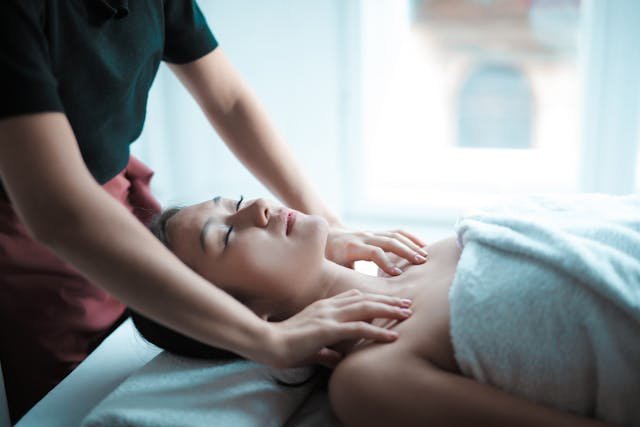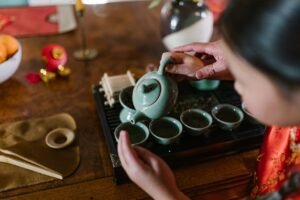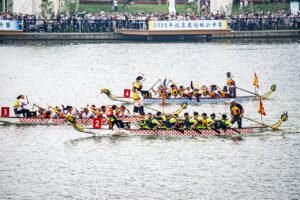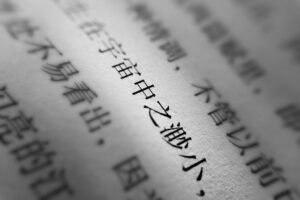China, a land of rich cultural heritage and ancient traditions, offers visitors a plethora of unique experiences. One such experience that seamlessly blends relaxation and education is the combination of enjoying a traditional Chinese massage while learning the Chinese language. This dual-purpose activity not only enhances your stay in China but also provides an immersive way to engage with the local culture. In this detailed guide, we will explore the art of traditional Chinese massage, provide extensive vocabulary, useful phrases, idioms, and practical tips to maximize your learning during a massage session.
Table of Contents
ToggleThe Art of Traditional Chinese Massage
A traditional Chinese massage, known as “中式按摩” (zhōng shì àn mó), is an integral part of traditional Chinese medicine (TCM). This practice is rooted in the ancient philosophy of balancing “阴” (yīn) and “阳” (yáng) energies within the body. The goal of a Chinese massage is to stimulate specific acupressure points to enhance the flow of “气” (qì), the vital energy believed to flow through the body’s meridians. This practice aims to relieve physical discomfort, balance the body’s internal energy, and promote overall health and well-being.
Techniques and Benefits
During a traditional Chinese massage, a therapist, or “按摩师” (àn mó shī), employs various techniques including kneading, pressing, rolling, and stretching. These techniques target muscles, connective tissues, and acupressure points to achieve several benefits:
- Pain Relief: Alleviates muscle and joint pain.
- Improved Circulation: Enhances blood flow and oxygen delivery to tissues.
- Stress Reduction: Relaxes the nervous system and reduces stress.
- Detoxification: Promotes the elimination of toxins from the body.
- Energy Balance: Restores balance to the body’s energy systems.
Extensive Vocabulary for Massage Sessions
To fully engage with your therapist and enhance your learning experience, it is helpful to familiarize yourself with an extensive range of vocabulary. Here is a comprehensive list of terms related to massage and wellness:
| English | Chinese | Pinyin |
|---|---|---|
| Massage | 按摩 | àn mó |
| Massage Therapist | 按摩师 | àn mó shī |
| Relax | 放松 | fàng sōng |
| Pain | 痛 | tòng |
| Comfortable | 舒服 | shū fú |
| Harder | 更用力 | gèng yòng lì |
| Softer | 轻一点 | qīng yī diǎn |
| Back | 背 | bèi |
| Shoulders | 肩膀 | jiān bǎng |
| Legs | 腿 | tuǐ |
| Feet | 脚 | jiǎo |
| Head | 头 | tóu |
| Arms | 手臂 | shǒu bì |
| Oil | 精油 | jīng yóu |
| Acupressure | 穴位按压 | xué wèi àn yā |
| Traditional | 传统 | chuán tǒng |
| Health | 健康 | jiàn kāng |
| Technique | 技术 | jì shù |
| Muscle | 肌肉 | jī ròu |
| Circulation | 循环 | xún huán |
| Tension | 紧张 | jǐn zhāng |
| Energy | 能量 | néng liàng |
| Pressure | 压力 | yā lì |
| Deep Tissue | 深层组织 | shēn céng zǔ zhī |
| Reflexology | 反射疗法 | fǎn shè liáo fǎ |
| Stress Relief | 缓解压力 | huǎn jiě yā lì |
| Balance | 平衡 | píng héng |
| Detoxification | 排毒 | pái dú |
| Holistic | 整体的 | zhěng tǐ de |
| Therapy | 治疗 | zhì liáo |
| Wellness | 健康 | jiàn kāng |
| Fatigue | 疲劳 | pí láo |
| Reflex Points | 反射点 | fǎn shè diǎn |
| Meridian | 经络 | jīng luò |
| Stimulation | 刺激 | cì jī |
| Healing | 治愈 | zhì yù |
| Detoxify | 排毒 | pái dú |
| Relaxation | 放松 | fàng sōng |
| Therapeutic | 治疗的 | zhì liáo de |
| Invigorate | 振兴 | zhèn xīng |
| Blood Flow | 血流 | xuè liú |
| Alleviate | 减轻 | jiǎn qīng |
| Mental Clarity | 精神清晰 | jīng shén qīng xī |
Engaging in Detailed Conversation
To enhance your interaction and learning, here are more detailed phrases and sentences that you can use during your massage session:
Basic Phrases
- “你好” (nǐ hǎo) – Hello
- “谢谢” (xiè xie) – Thank you
- “请” (qǐng) – Please
- “对不起” (duì bù qǐ) – Sorry
- “没关系” (méi guān xi) – It’s okay
Questions
- “我可以请你帮我按摩吗?” (wǒ kě yǐ qǐng nǐ bāng wǒ àn mó ma?) – Can I ask you to give me a massage?
- “这里痛吗?” (zhè lǐ tòng ma?) – Does it hurt here?
- “你学过这种按摩吗?” (nǐ xué guò zhè zhǒng àn mó ma?) – Have you studied this type of massage?
- “按摩对健康好吗?” (àn mó duì jiàn kāng hǎo ma?) – Is massage good for health?
- “你觉得气在体内流通得好吗?” (nǐ jué de qì zài tǐ nèi liú tōng de hǎo ma?) – Do you think the energy is flowing well in my body?
- “你推荐哪种按摩?” (nǐ tuī jiàn nǎ zhǒng àn mó?) – What type of massage do you recommend?
- “这种技术有什么好处?” (zhè zhǒng jì shù yǒu shén me hǎo chù?) – What are the benefits of this technique?
- “你觉得我需要多长时间?” (nǐ jué de wǒ xū yào duō cháng shí jiān?) – How long do you think I need?
Statements
- “这里痛。” (zhè lǐ tòng) – It hurts here.
- “可以轻一点吗?” (kě yǐ qīng yī diǎn ma?) – Can you be gentler?
- “力气大一点。” (lì qì dà yī diǎn) – A bit more strength.
- “我觉得很舒服。” (wǒ jué de hěn shū fú) – I feel very comfortable.
- “按摩对健康很好。” (àn mó duì jiàn kāng hěn hǎo) – Massage is very good for health.
- “我想放松一下。” (wǒ xiǎng fàng sōng yī xià) – I want to relax a bit.
- “请多按我的肩膀。” (qǐng duō àn wǒ de jiān bǎng) – Please focus more on my shoulders.
- “你可以教我一些中文吗?” (nǐ kě yǐ jiāo wǒ yī xiē zhōng wén ma?) – Can you teach me some Chinese?
- “这次按摩非常棒。” (zhè cì àn mó fēi cháng bàng) – This massage is excellent.
- “我喜欢这里的气氛。” (wǒ xǐ huān zhè lǐ de qì fēn) – I like the atmosphere here.
- “你认为我应该多久按摩一次?” (nǐ rèn wéi wǒ yīng gāi duō jiǔ àn mó yī cì?) – How often do you think I should get a massage?
Idioms and Expressions
Using idioms and expressions not only aids in language learning but also provides cultural insights. Here are more idioms and expressions related to health, relaxation, and well-being:
- “身心放松” (shēn xīn fàng sōng) – Body and mind relaxation.
- “舒筋活血” (shū jīn huó xuè) – Relax muscles and stimulate blood circulation.
- “养生之道” (yǎng shēng zhī dào) – The way to maintain good health.
- “事半功倍” (shì bàn gōng bèi) – Achieve twice the result with half the effort.
- “活络气血” (huó luò qì xuè) – Stimulate the flow of vital energy and blood.
- “气定神闲” (qì dìng shén xián) – Calm and composed.
- “精力充沛” (jīng lì chōng pèi) – Full of energy.
- “心旷神怡” (xīn kuàng shén yí) – Relaxed and happy.
- “神清气爽” (shén qīng qì shuǎng) – Refreshed and invigorated.
- “神清气和” (shén qīng qì hé) – Clear-headed and harmonious.
- “焕然一新” (huàn rán yī xīn) – Completely renewed.
- “身心俱疲” (shēn xīn jù pí) – Physically and mentally exhausted.
- “如释重负” (rú shì zhòng fù) – Feel relieved from a heavy burden.
Practical Tips for Engaging with Your Therapist
Most massage therapists in China are friendly and patient, making them ideal conversation partners for language practice. Here are some practical tips to help you make the most of your interaction:
- Start Simple: Begin with basic greetings and questions to ease into the conversation.
- Be Patient: Don’t worry about making mistakes; therapists are usually understanding and willing to help.
- Listen Actively: Pay close attention to the therapist’s responses and pronunciation.
- Repeat and Reinforce: Repetition helps in memorizing new vocabulary and phrases.
- Ask for Feedback: Don’t hesitate to ask the therapist to correct your pronunciation or grammar.
- Use Context Clues: Rely on the context of the conversation to understand and learn new words.
- Bring a Dictionary: Having a small dictionary or a translation app can be handy for quick references.
- Practice Regularly: Frequent visits and consistent practice will significantly improve your language skills.
Benefits Beyond Language Learning
Combining a massage with language learning not only helps you improve your Chinese skills but also enhances your overall experience in China. Here are some additional benefits:
- Cultural Immersion: Engaging in conversation during a massage gives you a deeper understanding of Chinese culture and traditional practices.
- Physical and Mental Well-being: The therapeutic benefits of a massage, such as stress relief and improved circulation, contribute to your overall well-being.
- Personal Connections: Building rapport with your massage therapist can lead to meaningful interactions and friendships.
- Practical Learning: Using language in a real-world setting helps reinforce your learning and improves retention.
- Relaxation and Stress Relief: Enjoy the immediate physical benefits of relaxation and stress reduction.
Conclusion
Combining the relaxing experience of a traditional Chinese massage with the practical task of learning the Chinese language provides a unique and enriching opportunity. It allows you to practice Chinese in a real-world setting while enjoying the therapeutic benefits of a massage. By using the provided vocabulary, phrases, idioms, and practical tips, you can make the most of your time and return home not only rejuvenated but also with improved language skills. So, the next time you find yourself in China, take the opportunity to say “我想按摩一下” (wǒ xiǎng àn mó yī xià)—I’d like a massage—and immerse yourself in both relaxation and learning.
Expanded Word List
- 按摩 (àn mó) – Massage
- 按摩师 (àn mó shī) – Massage Therapist
- 放松 (fàng sōng) – Relax
- 痛 (tòng) – Pain
- 舒服 (shū fú) – Comfortable
- 更用力 (gèng yòng lì) – Harder
- 轻一点 (qīng yī diǎn) – Softer
- 背 (bèi) – Back
- 肩膀 (jiān bǎng) – Shoulders
- 腿 (tuǐ) – Legs
- 脚 (jiǎo) – Feet
- 头 (tóu) – Head
- 手臂 (shǒu bì) – Arms
- 精油 (jīng yóu) – Oil
- 穴位按压 (xué wèi àn yā) – Acupressure
- 传统 (chuán tǒng) – Traditional
- 健康 (jiàn kāng) – Health
- 技术 (jì shù) – Technique
- 肌肉 (jī ròu) – Muscle
- 循环 (xún huán) – Circulation
- 紧张 (jǐn zhāng) – Tension
- 能量 (néng liàng) – Energy
- 压力 (yā lì) – Pressure
- 深层组织 (shēn céng zǔ zhī) – Deep Tissue
- 反射疗法 (fǎn shè liáo fǎ) – Reflexology
- 缓解压力 (huǎn jiě yā lì) – Stress Relief
- 平衡 (píng héng) – Balance
- 排毒 (pái dú) – Detoxification
- 整体的 (zhěng tǐ de) – Holistic
- 治疗 (zhì liáo) – Therapy
- 健康 (jiàn kāng) – Wellness
- 疲劳 (pí láo) – Fatigue
- 反射点 (fǎn shè diǎn) – Reflex Points
- 经络 (jīng luò) – Meridian
- 刺激 (cì jī) – Stimulation
- 治愈 (zhì yù) – Healing
- 排毒 (pái dú) – Detoxify
- 放松 (fàng sōng) – Relaxation
- 治疗的 (zhì liáo de) – Therapeutic
- 振兴 (zhèn xīng) – Invigorate
- 血流 (xuè liú) – Blood Flow
- 减轻 (jiǎn qīng) – Alleviate
- 精神清晰 (jīng shén qīng xī) – Mental Clarity
By immersing yourself in the dual experience of a traditional Chinese massage and language learning, you enrich both your physical and linguistic capabilities, creating a holistic and memorable experience in the heart of China.








